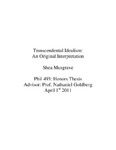| dc.rights.license | In Copyright | en_US |
| dc.creator | Musgrave, Shea Salisbury | |
| dc.date.accessioned | 2011-09-07T16:08:16Z | |
| dc.date.created | 2011 | |
| dc.identifier | WLURG38_Musgrave_PHIL_2011 | |
| dc.identifier.uri | http://hdl.handle.net/11021/23103 | |
| dc.description | Thesis; [FULL-TEXT RESTRICTED TO WASHINGTON AND LEE UNIVERSITY LOGIN] | en_US |
| dc.description | Shea Salisbury Musgrave is a member of the Class of 2011 of Washington and Lee University. | en_US |
| dc.description.abstract | As Paul Guyer and Allen Wood note in the preface to their translation of Kant's Critique of Pure Reason, "within a few years of the publication of his Critique of Pure Reason in 1781, Immanuel Kant (1724-1804) was recognized by his contemporaries as one of the seminal philosophers of modern times -- indeed as one of the great philosophers of all time." As Guyer and Wood also note, "to tell the whole story of the book's influence would be to write the history of philosophy since Kant." However, in spite of (or perhaps because of) this fact, Kant's philosophy is also highly controversial, especially his doctrine of transcendental idealism (hereafter abbreviated as TI). Indeed, as Henry Allison notes in his seminal work, Kant's Transcendental Idealism, "in spite of some sympathy shown in recent years for a vaguely Kantian sort of idealism or, better, anti-realism . . . Kant's transcendental idealism proper, with its distinction between appearances and things in themselves, remains highly unpopular." I hold that this is a great injustice. It is the goal of this essay to go beyond the immediate historical interpretation of what Kant believed his theory to be, in order to present an interpretation of TI that not only accomplishes the goals Kant set for his theory, but is also both philosophically plausible and relevant to contemporary discussion. [From the Introduction] | en_US |
| dc.description.statementofresponsibility | Shea Musgrave | |
| dc.format.extent | 66 pages | en_US |
| dc.language.iso | en_US | en_US |
| dc.rights | This material is made available for use in research, teaching, and private study, pursuant to U.S. Copyright law. The user assumes full responsibility for any use of the materials, including but not limited to, infringement of copyright and publication rights of reproduced materials. Any materials used should be fully credited with the source. | en_US |
| dc.rights.uri | http://rightsstatements.org/vocab/InC/1.0/ | en_US |
| dc.subject.other | Washington and Lee University -- Honors in Philosophy | en_US |
| dc.title | Transcendental Idealism: An Original Interpretation (thesis) | en_US |
| dc.type | Text | en_US |
| dcterms.isPartOf | RG38 - Student Papers | |
| dc.rights.holder | Musgrave, Shea Salisbury | |
| dc.subject.fast | Transcendentalism | en_US |
| dc.subject.fast | Anti-realism | en_US |
| dc.subject.fast | Kritik der reinen Vernunft (Kant, Immanuel) | en_US |
| dc.subject.fast | Criticism, interpretation, etc. | en_US |
| local.department | Philosophy | en_US |
| local.scholarshiptype | Honors Thesis | en_US |
